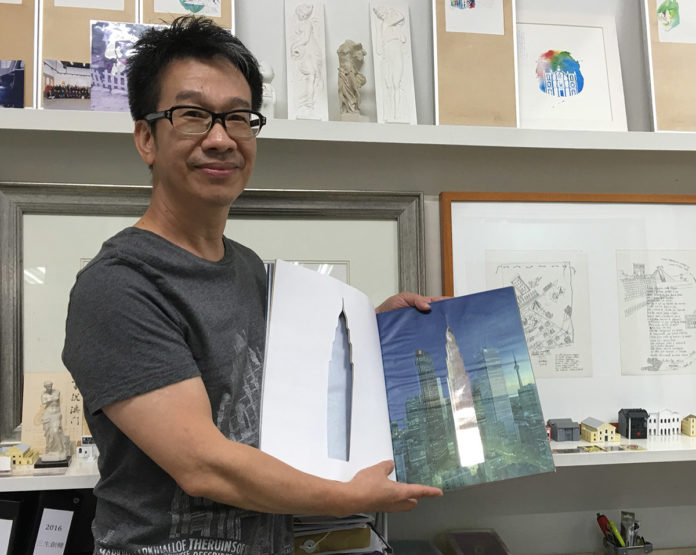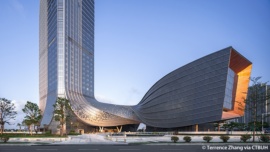Having left home at age 15 to begin his path as a corporate designer, Wilson Chi-Ian Lam – CEO and Creative Director of design and retail group Macau Creations – describes moving back to the MSAR from Canada to setup the company at a time before the cultural and creative industries were truly recognized, and explains the group’s outlook for expansion, the current status of the MSAR’s talent and what to expect politically in the near future.
Are you thinking about a new location for Macau Creations?
We always try to seek opportunities: where the opportunity has to be good for us, without too much expense, and so we can generate more business – that’s all we’re looking for, so we don’t limit ourselves in that aspect.
I have a shop on consignment base in Macau airport, and probably will open another retail location in Sands Macao, in the peninsula, possibly in December.
The Macau Tower and Cunha Bazaar are the two major shop locations. And last year, I think, we had one in a Sands China building in Cotai, but after a couple months I didn’t see that there was enough traffic, so I gave it back to my partner to run by themselves.
Therefore we now only have two main locations.
Have you thought about setting up at the Taipa ferry terminal?
I actually gave them a call and sent them an email, but no one really replied to me. For the old ferry terminal, I haven’t seen that they have anything like [Macau Creations] so I didn’t even bother to look for it. For the Taipa ferry, I sent them an email but haven’t yet gotten a response. They might have their own people with their own plan and so on; business is always like that.
Did you move back to Macau specifically to start Macau Creations?
Yes. The original plan wasn’t meant to be like that (laughs). Because I was in Toronto. I moved to Toronto in 1983 – I studied there, got married there and had a family, business and all that. I felt very comfortable, maybe too comfortable. So that’s why I thought ‘every time I come back to Macau I don’t see something that is striking for me, that interests me as representing Macau culture’. I wanted to challenge myself, and I put in a proposal in 2006.
I came back in 2008 and tried to look for the investor and then a partner which could actually operate the business. I wasn’t planning to come back, I just planned the business and then helped them to set it up: my idea together with my partner at that time.
Unfortunately after the 2008 financial crisis, one of the investors pulled back, but we still continued to start that [project]. Also one of my partners, who is a very famous designer who was helping me with that business, unfortunately we didn’t work out well, therefore I had to come back to Macau myself and he left the company.
So I came back for that reason. Of course I wanted to come back, but not at that early a stage. Because I still had business in Toronto, I had seven or eight people working with me at that time and I felt sorry for them because in the end I had to make a choice. I had already set up here and was beginning the business. Unfortunately I had no one to handle it and manage it, so I talked to my wife: ‘give me one year and come back to Macau and we’ll see how it goes’. After that she came back, then two or three years later my son came back to help.
There has been an acceleration in recent years in the recognition of the cultural and creative industries, and you returned to Macau right before that started. Would you say that you contributed to that acceleration?
I’m glad to be one of them. I believe I’m not the only one of them, of course. It just happened to come about that I was one of them at that moment.
It’s just a coincidence I guess. Everybody thinks that I’m so lucky because when I came back, the Macau government suddenly said ‘oh we’d like to promote the cultural and creative industries’. I said ‘what are the cultural and creative industries?’ I’d never heard that term ever before, I just knew I was doing advertising, doing graphic design. If you’d asked me what I did, I would have said that I’m a corporate designer. This is what I studied. Corporate design is my main task, so it’s just a coincidence and I’m glad.
How did that happen?
There’s two parts of it; one part is that I’ve been in that business for almost 40 years: very sad, still working on that (laughs). And back then no one cared about design and being an artist and being in the creative business.
My family did not really support me. When I was 15 years old they didn’t know anything about that [industry] and they very basically said ‘come back to work with your father and we’ll make sure you’re rich, you’re okay, we’ll look after you’. I said ‘no, I don’t want your business’ and I fought with him. I left home when I was 15.
I found my first job in advertising, and I stayed there and slept on the table for three or four years, because I couldn’t afford to rent a small room, because I only got paid MOP150, not per hour, per MONTH. US$20 per month.
After three months my master, my “si fu”, my boss, asked me: ‘hey Wilson, come here’. He gave me MOP300. And I was happy, I thought I’d gotten a 100 per cent raise. No.
‘You’re out,’ he said ‘you’re too naughty, too noisy so I’m kicking you out’.
I cried and said ‘give me one more chance, I have no home to go back to. I can’t go back’. I had to prove to him I loved the business, I wanted to stay. So he gave me one more chance, which changed my life. If he hadn’t wanted me to be there I would never be here.
Just that little story changed my life. After that I was a very good boy. Everybody started work at 9am but I started at 7:30, cleaning everyone’s tables, mopping the floor, doing all the possible things. So that’s how I started.
You defined yourself as being in corporate design. Would you ever call yourself an artist?
They are totally different things. Artists create, they don’t need to have the answer, they don’t care about you, they don’t care about anyone else, otherwise it’s not creative; why bother to ask you what you want? They just do what they like, they believe in what they do. Designers cannot do that. The first thing designers have to learn is to listen to what the people want.
If people ask you to give them a three-eyed cat on Wednesday at 3pm, don’t give them other animals on Thursday at 2pm. Simple as that. If you want to prove that you are the best designer, first you listen to what the people want, and second use your own time to do more to improve it.
And I don’t consider myself qualified yet as a real fine-art artist. I respect the fine artists, the quality of it, what level you have to achieve to become an artist – they have to be very into it, and intimate with what they do. So I think I’m just an art lover.
There is a lot of talent in Macau. How would you say that has grown in the past couple years? You’ve handpicked your team. Do you think there’s a large talent pool to choose from?
No. A lot of [talented people] leave Macau.
I would say that in Macau nowadays more people recognise what design is, the function of it. And a lot of people are interested in studying art and design, so yes there’s more to pick from, but I think there’s not enough.
Because Macau has a very big difficulty for businesses. Because we’re facing costs which are very high: rent, benefits, everything. It’s a phenomenal cost. Very often, where before we would buy things from Macau to take to Canada, now that has reversed.
The government started having a lot of funding and helping young people to start up. And the young people don’t want a long-term relationship. It’s not like in my time; my generation would work with one company for many years, have a very close relationship with the boss – like a master-mentor, father-son relationship – nowadays it’s no longer like that. It’s different nowadays.
Nowadays, the cost for young people to set up their own business is a lot lower than before. Before they actually handed out the cultural and creative fund, we had to use our own money to rent out a space, start a business. But after we had spent a lot, the government later on says ‘hey, we suddenly have money’. And they become your competitors. That’s a little bit difficult, and yet not just that because the Internet, the business model, the medium, advertising approach – everything, the behaviour – it’s all changed. Not just because of Macau and the government, what I mean is that it’s a worldwide situation. People are saying that now the world has become flat, which is true, because now you’re competing with all the people on the Internet.
And also the buying habits have changed. Speaking about maybe 10 or 15 years ago, when people travelled, they very often would pick up something, because they didn’t want to miss anything, they wanted to pick up something and take it home and show it to people. Nowadays you don’t need to do that. It’s just picture, picture, picture. And then you don’t need to carry anything.
It seems like many of the young people setting up these businesses don’t have the experience behind them to carry on the business in such a challenging environment. Do you think so?
It’s a really bad idea. Because the young people think ‘I want to start my business’. For example, the street outside our office. Some people who’ve worked only one or two years – not enough experience – and suddenly the government says, ‘oh I’ll give you MOP300,000 for you to start a coffee shop’.
They say, ‘oh I love it, I’ve always had a dream of having a coffee shop, or whatever’.
So they break open their piggy bank and use whatever money they have, ask the father to give them money, bring it all together with the government funding and start the business, but they don’t have an idea. They spend a lot of money and start to open the business – after two months, three months no one comes – and it’s gone.
And the worst thing is that when they’re there, they influence other businesses. And if they’re all bad…. We often talk to the young people and urge them to not jump immediately into starting a business, be really sure of what you want to do.
Why? Because your boss is actually paying for your mistakes, taking all the risk.
How many people do you have working in Macau Creations?
The whole organisation – including the retail, the management and so on – I think around 40 to 50.
Are you working with MGTO and having a presence at some of the exhibitions?
Firstly, my business is not just the two retail locations. My major other business is design, still. I didn’t want to do that, but have to do it, otherwise I cannot survive (laughs). Also, taking the projects for different government groups like MGTO (Macau Government Tourism Office): they often have bidding proposals and want us to give them some design ideas for different events and so on. And very often we’ll work with them very closely. As you know, in Macau, due to the legal purchasing act, they cannot just give it [the job] to you as a client. They have to go through a public tender process. Therefore it’s important, but it’s not guaranteed.
In its public tenders, the government has been known to pick the proposal with the lowest price. How do you feel about that?
That’s really sad. Because I was in the Cultural and Creative Industries Committee for three terms, every term is two years. And I often talked about this with other colleagues and said that the system is really killing the business. I very often submit proposals and they say ‘your design is great but your price is a little bit high’.
They said that it would change a little bit, but I don’t know how much it will change.
The Cultural and Creative Industries Committee added representatives of the gaming sector recently. Do you think that will help in expanding opportunities?
I think to have different voices is important. As a government, to want to gather all the information from different angles, different career or sector points of view. I think without question that is important.
Whether they really listen to what you want is a different thing. It’s a government thing. ‘We already have the committee, we asked that question, we did a study’. But everywhere is like that.
So I would say that it’s hard to measure and I don’t expect that it will change completely. Politically it has to happen, and yes, eventually they will have some sort of influence for whomever, bad or good, but they will have an influence for sure.
Regarding the upcoming elections, do you think at the political level that anything will change in regards to the cultural and creative industries and diversification?
The direction is already set, which is that Macau wants to be less-dependent on the casino business. They want the entertainment, leisure, tourism, cultural and creative industries and so on. So they must carry that message. As a good student of the Master Xi [Jinping], they will do good homework. Whoever’s in that chair is smart enough at least to do good homework. Therefore, we still have a good opportunity, young people still have a good opportunity.
Macau businessmen are always very straightforward. They will never talk about design, they don’t care about creative culture, not ever. This is the only period in the past 600 years in Macau when these people have suddenly woken up: ‘oh we love art, we love culture’. And we’re like ‘oh yeah?’
And good, at least they also want to help the government in doing that.
They need to do more work, seminars, propaganda.
Eventually it will add up. There are still good trends, good opportunities for people doing the creative business, so therefore I’m still here.
I think there are still a lot of opportunities, such as those who are starting their businesses in Hengqin island. There’s a lot going on for the creative businesses there. Again, because there’s a flow, there’s a trend, there’s an order I would say. So it will continue for five to ten years I think. I think Macau needs that. Macau also has very good elements to do that business, because everything is close to everything else. I always said, Macau is a theme park.
























